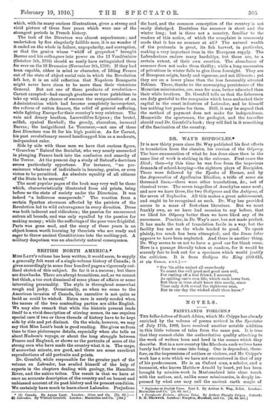DR. WAY'S SOPHOCLES.*
IT is now thirty years since Dr. Way published his first efforts in translation from the classics, his version of the Odyssey. The bare enumeration of what he has done since then in the same line of work is striking in the extreme. First came the Iliad; then—by this time he was free from the imperious demands of school-keeping—the eighteen plays of Euripides. These were followed by the Epodes of Horace, and by the Argonautica of Apollonius Rhodius, a trifle of some six thousand lines,—there were other translations, &c., not of classical verse. The seven tragedies of Aeschylus came next ; and now we have three, the two Oedipuses and the Antigone, of the seven of Sophocles. All this makes a great achievement, and ought to be recognised as such. Dr. Way has provided access to a mass of first-class literature. But we must frankly own, as we have had occasion to say before, that we liked his Odyssey better than we have liked any of its successors. Practice, in Dr. Way's case, has not made perfect. It has made the task of translation facile in a way, but the facility has not on the whole tended to good. To speak plainly, too much has been attempted; and the limae labor appears to have been neglected. And there is another thing. Dr. Way seems to us not to have a good ear for blank verse. Here is a passage literally taken at random, for it would be scarcely fair to look out for a specimen which would justify the criticism. It is from Oedipus the Sing (609-615,
00 yap Sinalov, r-
" For 'tis alike unjust all causelessly
To count the evil good and good men evil, For casting off a leaf friend, I account As spilling one's own life, which each loves best.
But thou in time shalt know this surely, since Time only doth reveal the righteous man, But in one day the wicked shalt thou know."








































 Previous page
Previous page